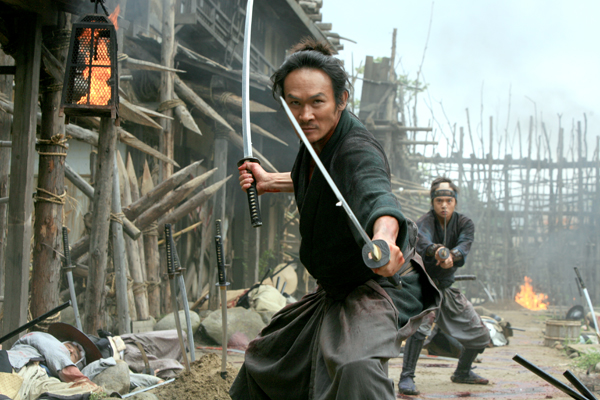|
Reviews of Recent Independent, Foreign, & Documentary Films in Theaters and DVD/Home Video

13 ASSASSINS 13 Assassins is a masterful example of action direction. While the plot of the film is strong enough to hold our attention, it’s the build up and anticipation—and the bloody big pay-off—that works so well. What director Takashi Miike pulls off is something special in our modern super-hyper-kinetic-frenzied action movie world. It’s surprisingly straightforward, but in the thick of it, you’ll get lost in the violent mayhem (which, compared to some of Miike’s more notorious works, could be considered tame, but not by much). The plot, set in 19th-century feudal Japan, is right out of Seven Samurai or even The Dirty Dozen. Lord Naritsugu (an eerily calm performance from Goro Inagaki) is one nasty bugger, who spends his time raping and killing with a cold detachment, cutting off limbs of women and shooting arrows at children just because it’s, to him, the “samurai way” or something. Another lord, Sir Doi (Mikijiro Hira), makes a clandestine request of another samurai, Shinzaemon (Koji Yakusho), to gather up a bunch of noblemen to take out Lord Naritsugu before another clan protects him completely. In other words, while Naritsugu’s on the move, take the bastard out. Along their trip to intercept him, they run into a kind of forest drifter-hunter, Koyata (Yusuke Iseya), who acts as the comic relief in the same way as Toshiro Mifune in Seven Samurai. We know who the players are and their morals—Naritsugu has zero, Shinzaemon and the rest have plenty, or at least they understand something essential to humanity in the samurai/servant code that Naritsugu does not. And with this, Miike sets the stage for the interception of the lord with his soldiers in a small village… all 200 of them against 12 samurai and a crazy hunter bum from the woods. Throughout Miike and his cinematographer Nobuyasu Kita create a world that’s patient and assured in how it’s composed, where shots actually linger for a little longer than one might see in an action movie from Hollywood (that is, for its first two-thirds). It’s a credit to the filmmaker, who takes influences from classic black-and-white samurai and sword-play pictures from the 1960’s and ’70’s, from the likes of Masaki Kobayashi (aside from the original 1963 13 Assassins, directed by Eiichi Kudo). This is not to say that Miike, one of the world’s few true wild men when it comes to craziness, doesn’t apply some of his own touches. Lord Naritsugu fits in with the director’s penchant for totally messed-up antagonists who have a strange relationship with pain and torment. And in the big and outrageous climactic battle, bulls set on fire run through the village on the attack. Things like that make one laugh more for the level of absurdity than for anything intentionally funny. Speaking of the battle scene: holy Moses! This is the reason I think Miike really made this film, but why carp? For an action movie lover who likes good, long, stunt-coordination with swift, graceful, and bloody fighting and intensity, this is the pick of the month, maybe the year. It’s breathtaking, and it doesn’t let up for 40 or so minutes. Whether the battle scene’s longer in the uncut version I can’t say. The U.S. release is trimmed by 15 minutes from the original Japanese release. But even so, it doesn’t feel compromised. This is action filmmaking that cherishes shots where you can see all of the violence played out long enough to take it in, cut so that it’s visceral but not so fast as to lose the spatial relationships, and with real stuntmen and real blood (a rare treat in 21st-century Japanese splatter pics). 13
Assassins
has integrity in terms of its storytelling and character relationships,
which are simple but wonderfully conventional, and it even hints near
the end at something spiritual in the air. It also embraces themes like
honor and loyalty but without corniness. As a genre fan, one wants to
rush out to folks dying in the sewage of the multiplex and hand them a
movie ticket and scream, “Go “HERE!”
Jack Gattanella
|

